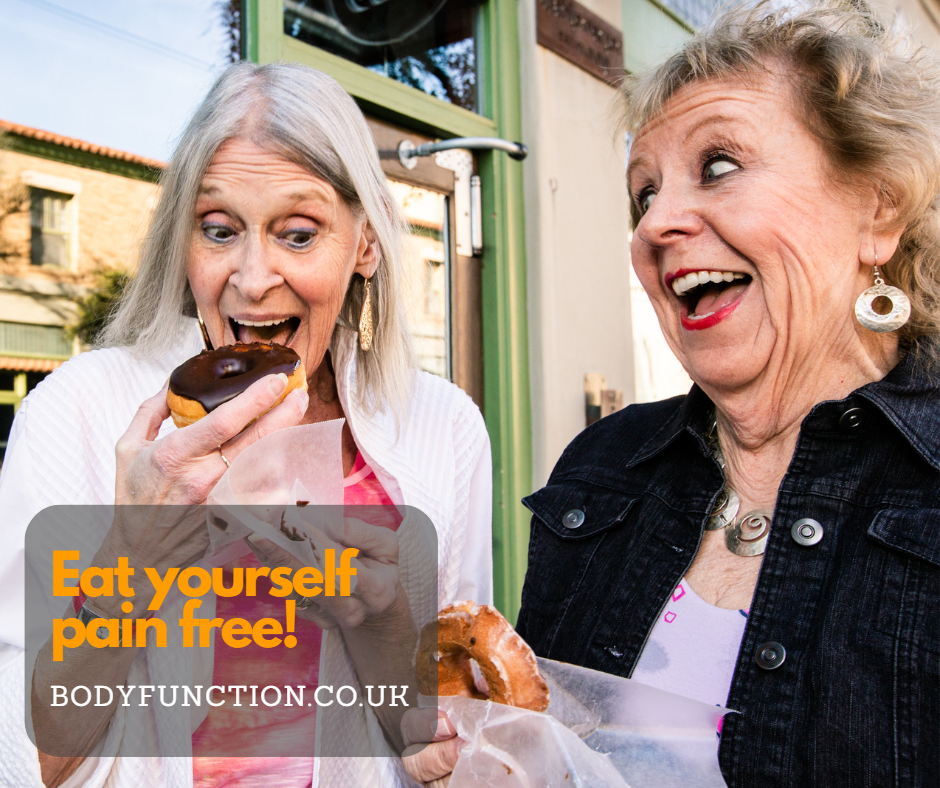24/7 online booking

Eat yourself pain free!
That is quite an inflammatory title, but in fact what I want to talk about is, anti-inflammatory. I'm also afraid sugary doughnuts are not part of the menu!
Most pain is associated with inflammation, because inflammation is part of the body’s natural response to any kind of injury, be that physical, chemical or even emotional. Under normal circumstances when an injury occurs a whole cascade of events takes place to isolate, eliminate and eventually repair the injury and inflammation is part of that process. This process can become chronic (long-term), because the changes have gone on for so long and affected the local cell growth the inflammatory process can become harmful instead of healing.
Inflammation happens whenever we are subject to any kind of injury, major or minor and the amount of it present at any time depends on many factors such as your fitness levels, stress levels and the quality of your sleep. Younger people tend not to notice inflammation as they are more able to control the levels to that required for healing, but the effects of ongoing injuries, illness and stress tend to accumulate so that as we get older we start to notice when things go wrong.
Chronic inflammation is part of many diseases such as heart disease, diabetes, arthritis, irritable bowel, asthma and even Alzheimers, so anything we can do to lessen chronic inflammation has to be a good thing and diet plays a critical role in this.
Eat Pain Free:
The first thing is to increase the amount of ‘anti-inflammatory foods’ in your diet to include
- oily fish (salmon, mackerel, sardines, herring)
- fresh whole fruits and vegetables especially the dark green red and orange ones
- nuts, seeds and pulses
- whole grain, especially oats
- lean poultry
- olive oil
- green tea
- spices such as turmeric, garlic and ginger
You also should cut down on the ‘inflammatory foods’ such as
- sugar
- processed foods
- fried food
- white flour products such as white bread and pasta
- refined oils
- caffeine and fizzy drinks
Be careful when buying pre-packaged food that is labelled as ‘healthy’ it may have reduced fat but this is made up for by thickening with processed starch and increased sugar. Cooking from fresh ingredients means you know what has gone into your food.
Other things you can do to help control chronic inflammation are
- Exercise regularly, low intensity regular exercise has been shown in studies to reduce inflammatory markers.
- Get enough sleep, much healing occurs when we are at rest.
- Maintain a healthy weight, obesity is also linked to many of the diseases associated with chronic inflammation, at the very least try to cut down on processed food, sugar and hydrogenated fat.
- Relax, try to reduce stress levels, even if this means taking just 5 minutes now and again throughout the day to breathe slowly and clear your mind.
An anti-inflammatory diet is not going to work fast like taking an anti inflammatory medication such as ibuprofen, but after following this even for a few weeks many people notice an improvement in symptoms. At this stage, there is still a lot of research to be done in order to prove that these dietary changes work to reduce inflammation but results so far look very promising.
If you haven’t managed to eat yourself pain-free, then we are here to help you further. Book with one of our osteopaths for a full investigation into you your pain by clicking here.


Leave a comment